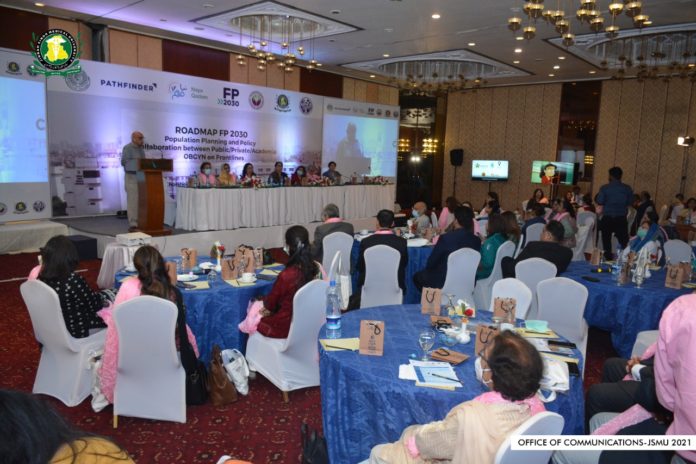KARACHI: Experts in the field of reproductive health warned at a seminar on Wednesday that lack of family planning and contraceptive awareness in Pakistan is leading the country towards a population emergency.
This was stated at the event titled ‘Road Map to Family Planning 2030’. Leading obstetricians and gynaecologists, policymakers, and members of academia attended the event organised by the Sindh Reproductive and Genetic Health Centre-Jinnah Sindh Medical University, with Costed Implementation Plan (CIP) Sindh and Pathfinder International at a Karachi hotel.
Road Map 2030 Family Planning aims at achieving targets of population planning and policy and boosting contraceptive prevalence by up to 50 per cent by 2030.
Addressing the audience, acting Vice Chancellor JSMU Professor Shahid Rasul lauded the initiative by Dr Nighat Shah and proclaimed that lack of family planning and contraceptive awareness is leading us towards population emergency.
The panel discussion on the responsibilities of ob-gyn was moderated by Dr Shershah Syed. The panellists stressed on collaboration between the public/private/academic general practitioners and stakeholders to accomplish family planning objectives, along with modern-day contraceptive awareness amongst females. Comprehensive approach involving paediatricians, family physicians, and nurses was stressed for effective counselling of couples regarding reproductive health.
The panellists included chairperson Ziauddin Hospital Dr Rubina Hussain, Dr Lumaan Sheikh, chairperson ob-gyn Aga Khan University Hospital, Dr Azra Ahsan vice president (NCMNH), pro-vice chancellor Dow University of Health Sciences (DUHS) Dr Nusrat Shah, Dr Sarah Qazi professor Civil Hospital Karachi and Prof Haleema Yasmin from Jinnah Postgraduate Medical Centre.
Dr Nighat Shah, director SRGHC-JSMU, moderated the second panel discussion. Panellists included Professor Lubna Ansari Baig, chairperson APPNA Institute of Public Health (AIPH-JSMU), Dr Syed Aziz Rab CEO Greenstar Social Marketing, Dr Tabinda Sarosh country director Pathfinder International, Dr Yasmeen Sabih Qazi senior advocacy advisor Bill and Melinda Gates Foundation, Rehan Baloch Secretary PWD, government of Sindh and Dr Talib Lashari (technical advisor).
“We should target our youth, incorporate use of technology and create health literacy strategic programme for enhancing awareness amongst the upcoming generations’, said Professor Lubna Ansari Baig.
Highlighting the reinforcement of stereotypical societal norms, Dr Yasmeen Sabih Qazi said that “As policymakers, it is our institutional responsibility to bust myths surrounding the side-effects of IUCDs and usage of modern-day contraceptives and create awareness [as] a part of our service delivery structure.”
An interactive discourse between experts and audience highlighted the need for comprehensive introspection in creating contraceptive-awareness.
Responding to a question, Dr Shaheen Zafar director SIRM underlined that doctors should speak to their patients and prevent malnourishment in women and children.
“The CIP moved towards consolidated reforms after 2017 consensus and planned six strategic objectives, including integrated implementation plans, tapping … urban slums, meeting the unmet needs with commodities available on provincial and district level,” shared Dr Talib Lashari, technical advisor CIP 2020/2030.
The seminar was attended by around 100 obstetricians, gynaecologists and public health experts.
